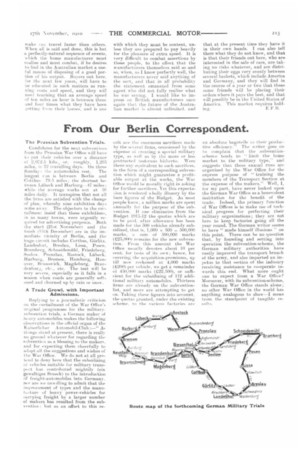From Our Berlin Correspondent.
Page 7

If you've noticed an error in this article please click here to report it so we can fix it.
The Prussian Subvention Trials.
Candidates for the next subventions horn the Prussian War Office will have to put fheir vehicles over A distance of '2,072.5 kilo., or, roughly, 1,295 miles, in 22 travelling days. On three
Sundays the automobiles rest. The longest con is between Berlin and (lottbus-79.5 miles; the shortest between Lubeck and H.arburg ••-47 miles; while the average works out at 511 miles daily. it transpires that not all the firms are satisfied with the change of plait, whereby nine exhibition days OCM45 aivay. The objectors to the. curtailment insist; that these exhibitions, in as many towns, were urgently required for advertising purposes. Both the start (21st November) and the field; if 5th December) are in the immediate vicinity of Berlin, and the huge circuit neludes Cottbus, Gorlitz. Lunde-shut, Breslau, Lissa, Posen. Bromberg, Sehneidemiihl, Friedeberg, Seel() w , Prerizisu, Rostock , Liibeek. Marburg, Bremen, Hamburg, Hanover, Brunswick, Magdeburg„ Brandefiburj., ett.., etc. The test will be very severe, especially as itfalls in a season when roads are generally softened and churned up by rain or snow.
A Trade Growl, with Important Admissions,
Replying to a journalistic criticism or thecurtailment of the War Office's original programme for the militarysubvention trials, a German maker of heavy automobiles makes the following observations in the official organ of the Raiserlicher Autemohil-Olub :—" As things stand at present, there is really no ground whatever for regarding the intlivention as ablessing to the makers. and for expecting them cheerfully to adopt all the suggestions and wishes of the War Officio. We do not at all pretend to deny here that the subsidizing oh vehicles suitable for military transport has contributed mightily (ein gewaltiges Stneck) to the introduction of freight-automobiles into Germany. tier are we unwilling to admit that the improvement of types and the maimlieture of heavy power-vehicles for carrying freight by a larger number of makers has resulted from the subvolition : but as an offset to this re stilt aye the enormous sacrifices made by the several firms, occasioned by the expense of 'Tenting a speeial military type, its well as by the more or less protracted test-runs hitherto. Were there any eyilvalent to sucit saerifiees. in the form of a corresponding subvention which might guarantee a profitable outpet at the works, the War Office would be morally right in asking for further sacrifices. Yet this expectation is rendered a bully illusory by the bare figures of the Budget. As most people kiwi), a million marks are spent ;Limn:illy for the purpose of the subvention. 11 one eliminates from the Budget 1.911-12 the quotas which are to be paid. after allowance has been made for the 500 vehicles already subsidized, that is, 1,000 x 500 = 500,000 marks, a sum -of 500,000 marks (t.25,000) remains for the new subvention. From this amount the War Office usually devotes about 10 per cent, for tests of its own ; hence, for vovering tile acquisition-premiums, up till now reckoned at 4,000 marks (t200) per vehicle, we get a remainder oi 450,000 marks (22,500), or sufficient for the subsidizing of J12 additional military automobiles. Thirteen firms are 4t1ready on the subventionlist, and more are attempting to get on. Taking these figures into account, the quotas granted, under the existing seheME.. To the varieus factories ere an absolute bagatelle to their productive efficiency." The writer goes on to complain that the subventionseherne tends to " limit the home market to the military type," and suggests that these annual runs are organized by the War Office for the express purpose of " training the members of the Transport -Section at the expense of the makers." Weil, I, for my part, have never looked upon the. German War Office as a benevolent institution for the benefit of the trade. Indeed, the primary function of War Offices is to make use of technical progress for perfecting their military organizations; they are not here to keep factories going all the ye-ar round. The German writer seems to have " made himself illusions" on this point. There can be no question that, by founding and setting into operation the subvention-scheme, the German military authorities have vastly improved the transport branch of the army, and also imparted an impetus to that section of the industry receiving assistance to co-operate towards tilLs end. What more ought one to expect from a War Office? Moreover, with its subvention-scheme, the German War Office stands alone; no other War Office in the world has anything analogous to show---I mean tram the standpoint of tangible resole,.






















